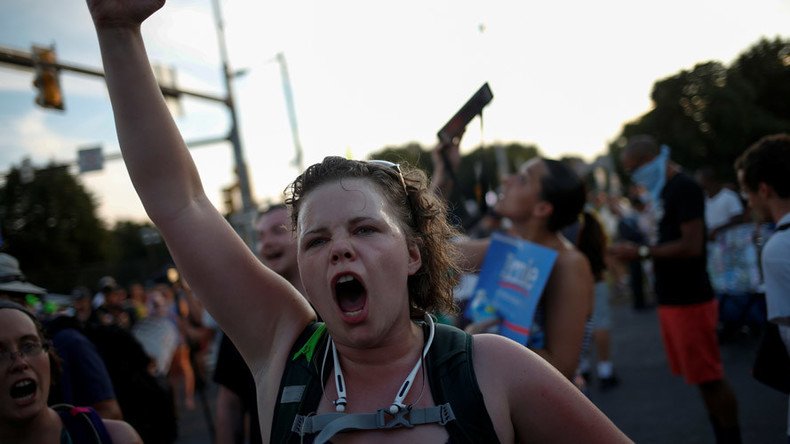2 in 3 young Americans say GOP and Dems don't represent them

Despite the millions of dollars spent on primaries, national conventions, and hours of television coverage, the majority of young Americans are disenfranchised by both the Republicans and Democrats, according to a new poll.
Across racial and ethnic groups just 28 percent of young adults said the two major parties do a good job of representing them, according to a new GenForward poll.
While 72 percent of young Americans felt disenfranchised by the two-party system, the Democratic Party still had an advantage in appealing to young people of color. Large majorities of black voters, 66 percent; Asians, 65 percent; and Latinos, 58 percent, believe the Democratic Party care about people like them.
On the other side of the aisle, a majority, especially among young people of color, thinks the Republican Party is too extreme.
Unemployment, low wages make third of young Americans live with parents https://t.co/FXx5keHBSOpic.twitter.com/fyghthFAbJ
— RT America (@RT_America) May 26, 2016
For young whites, the majority felt evenly split between the both parties. Fifty-eight percent said the Republicans didn’t care about their issues, and 52 percent found the Democrats didn’t care.
Issues of concern to young adults are their economic futures, the police and the criminal justice system, terrorism, gun violence and LGBT policy issues.
The majority of young adults said Trump, the billionaire real estate magnate is “unqualified to be present even after beating 16 GOP rivals.” Others were just as critical about the Democratic candidate.
"There's more hope, I think, for the Democratic Party, but we're going to have to force them," Michigan resident, Rachel Mace, 20, told Associated Press. Mace supported Sanders and wants a party that makes a meaningful commitment on public financing reform. As for Clinton, "I find her to be incredibly corrupt."
Trying to lure young voters, Politico reported Hillary Clinton’s presidential campaign went to Las Vegas and held a fundraiser at the Black Hat hacker conference this week. For $100 to $2,7000, donors were able to mingle with former officials from the Defense and Homeland Security Departments. Clinton’s cyber and tech platform has been met with a mix of praise and condemnation by the hacker community.
Young Americans know next to nothing about their student loanshttps://t.co/zr4m8vSKV3
— RT America (@RT_America) February 3, 2016
Media pundits suggest that third party candidates could do well in the election among young people, but when polled by GenForward, there was a lack of familiarity with those alternative candidates.
Libertarian Party candidate Gary Johnson received 11 percent of support among young whites, with blacks polling just 3 percent, Asians 4 percent and Latinos 5 percent. Green Party candidate Jill Stein received less than 5 percent support from young adults of all racial and ethnic groups.
“The data…suggest these candidates suffer from extremely high levels of unfamiliarity among young people. Large majorities of young adults across all racial and ethnic groups said they did know enough about Gary Johnson and Jill Stein to say whether they held favorable or unfavorable views of them,” stated the GenForward poll. “Most young adults do not appear to have taken even a casual look at third-party candidates.”
Nearly every young American voter wants an independent on the ballot https://t.co/ggeT1ntuPY#notjusttwopartiespic.twitter.com/ATl50Wdbp0
— RT America (@RT_America) May 19, 2016
Young people across racial and ethnic groups were more likely to support Vermont Senator Bernie Sanders than the Democratic candidate Hillary Clinton in their primary battles. Among Sanders supporters, less than half, 43 percent said they will support Clinton against Trump in the fall election. Overall 52 percent said they were undecided and will vote for a third-party candidate or will not vote, with 3 percent saying they will support Republican presidential candidate Donald Trump.
GenForward is a national monthly poll organized with The Black Youth Project surveying young adults aged 18-30-years-old, with oversampling of Black, Latino and Asian American respondents.
The poll data came from 1,940 adults conducted July 9-30 using GenForward sampling methods based on address with interviews online or by phone.












